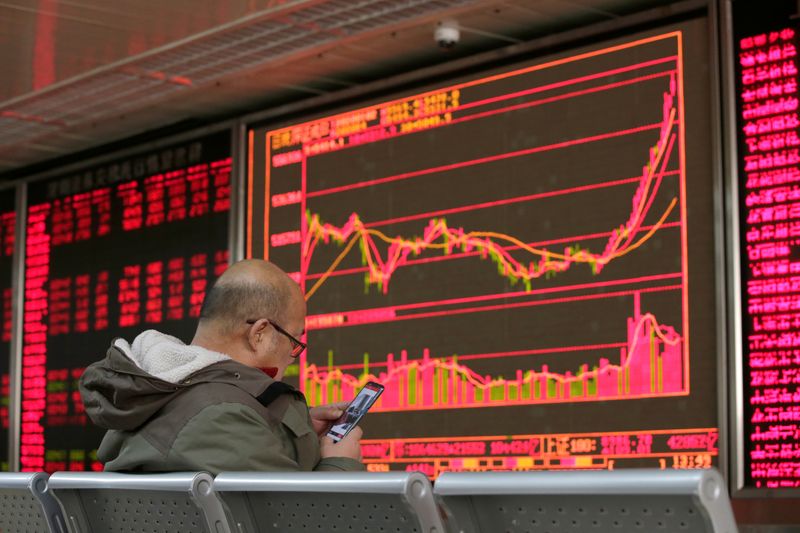Investing.com-- Most Asian stocks fell on Monday with Chinese markets leading losses on persistent concerns over a trade war with the West, while anticipation of more signals on interest rates also kept markets on edge.
Regional markets largely disregarded a positive lead-in from Wall Street on Friday, as growing bets on interest rate cuts saw the S&P 500 and the NASDAQ Composite clock new highs. But anticipation of more cues on rates- from Federal Reserve Chair Jerome Powell and from key inflation data this week- tempered this optimism.
U.S. stock index futures drifted lower in Asian trade.
Middling economic data from Japan and Australia also weighed on regional stocks.
Chinese stocks sink as trade jitters weigh
China’s Shanghai Shenzhen CSI 300 and Shanghai Composite indexes fell 0.3% and 0.5%, respectively, while Hong Kong’s Hang Seng index slid 1.5%.
Sentiment towards China remained largely negative after the European Union imposed steep tariffs on the import of Chinese electric vehicles, despite objections from Beijing. China had also raised the possibility of a trade war with the EU over the tariffs.
The EU tariffs mirror a similar move by the U.S., and ramped up concerns that worsening trade ties with China, which could see Beijing introduce retaliatory measures.
Chinese stocks were already nursing a steep decline from their 2024 peaks over the past two months. Focus in July is on the Third Plenum of the Chinese Communist Party, a meeting of high-level officials that is likely to yield more stimulus measures for the economy.
Chinese trade and inflation data is on tap later this week.
Japanese stocks hover near record highs
Japan’s Nikkei 225 and TOPIX indexes retreated slightly on Monday after coming close to record highs last week.
Strength in Japanese stocks was driven largely by foreign buying, as the yen slumped to 38-year lows. Doubts over more interest rate hikes by the Bank of Japan, amid weak Japanese growth, also presented a more positive outlook for local stocks.
Data on Monday cast some doubts over this trend, as average cash earnings in the country grew at their fastest pace in 31 years in May, indicating that inflation and consumption could pick up in the coming months.
Japan also clocked a bigger-than-expected current account surplus, while bank lending increased more than expected.
Broader Asian markets were largely subdued. Concerns over China saw Australia’s ASX 200 sink 0.4%, while losses in commodity prices also dented major mining stocks.
Data showed Australian home loans unexpectedly shrank in May, while housing finance activities also contracted.
South Korea’s KOSPI fell 0.1%, while futures for India’s Nifty 50 index pointed to a marginally positive open, after the index hit a series of record highs last week.
